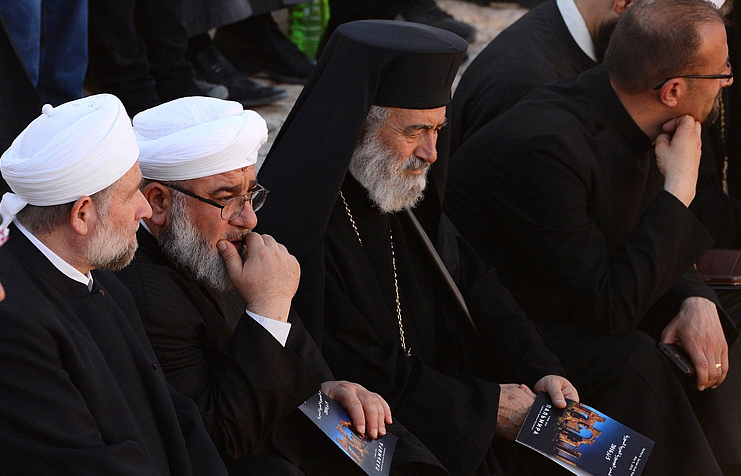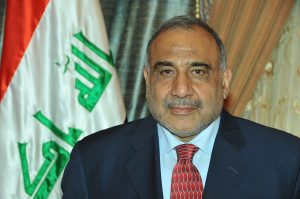by James J. Zogby
Christians in the Levant, especially those in Syria, Iraq, and Palestine, are facing grave challenges that are either misunderstood or ignored in the West. In recent years, protecting them or even acknowledging their existence has only been a concern of policy-makers or advocacy groups when it has fit their accepted narratives or political agendas for the region.
The Christians of Palestine, for example, are for the most part ignored. They are an uncomfortable burden to right-wing evangelicals who will only allow themselves to see Israel through ideological blinders. They view the in-gathering of the Jews to Israel as a necessary prerequisite for “the end of days”: the battle of Armageddon, the conversion of the Jews to Christianity, the return of the Messiah, and all that follows.
These evangelicals come to the Holy Land as pilgrims to the places where Jesus walked. They visit the holy sites, all the while ignoring the existence of a Christian community whose presence in Palestine dates back two thousand years. Because right-wing evangelicals have become fervent defenders of Israeli policies, they not only refuse to acknowledge the grave injustices suffered by their co-religionists, they render them invisible.
Unfortunately, this same blindness also affects politicians from the right and the left. Because criticism of Israeli behavior is considered a taboo, most politicians have cultivated a willed ignorance about Palestinian victims, whether Christian or Muslim. As a result, they have remained silent as Palestinian religious properties have been confiscated or vandalized and as Israel has imposed a political system that entitles one group, Jews, while Christians and Muslims are subjected to a variety of harsh discriminatory practices.
The Christians of Iraq and Syria have endured a different, though no less problematic, fate at the hands of the West.
In the lead up to the US invasion of Iraq, no one in Washington even considered what the impact of the war might be on that country’s substantial though vulnerable Christian community. In the years that followed, as the Iraq was being torn apart by sectarian conflict, American political and religious leaders largely ignored the fate of Iraq’s minorities. The Bush Administration, for example, remained silent while Christian businesses were looted, homes confiscated, and families forced into exile—resulting in the decline of Iraq’s Christians from 1.4 million to 400,000. Saving this ancient Christian community didn’t fit the US political agenda, and so their cries for recognition and protection were not heard.
Only in the face of the barbaric behavior of the Islamic State (ISIS or IS) has the West begun to pay attention to what remains of the Christians of Iraq. Only now, it appears, does their fate fit a political agenda—a partisan attack against the President and a way for right-wing anti-Muslim advocacy groups to belatedly shed some tears.
In like manner, the voices of the Christians of Syria were ignored in the beginning of that bloody conflict. Many Christians, though not supporters of the regime in Damascus, expressed deep discomfort with, and even fear of, the “opposition”. Because the Assad government had adopted a secular approach that provided some protections for Christians, they were sometimes called collaborators and were shut out of political discussions about the future of their country—especially in the West.
Only now, with the rise of IS, have Western churchmen and politicians begun to pay attention to Syrian Christians—but, as has been the case in Iraq, it is too little, too late.
The bottom line is that these Arab Christians ought to matter and their voices need to be heard—and not only when what they are saying fits our agenda. They are more than just refugees or victims of religious extremism who provide a useful tool for Islamophobes to warn of the dangers posed by Islam.
Arab Christians are communities of long-standing who have been an integral part of the development of the culture and social fabric of the Levant. Their survival is critical to that region. Recognizing their rights, listening to their concerns, and attending to their needs can provide lessons for policy-makers. And the very vulnerability of Arab Christians of the Levant has made them a litmus test for our policies.
For example, the silence of the West in the face of Israel’s continued strangulation of the Palestinian Christian community indicts our human rights policies as self-serving, flawed, and infected by a fatal double-standard.
The fate of Iraqi Christians should have served as an early warning for Americans that the sectarian-based system of governance that was being imposed on Iraq was fraught with danger. Similarly, the fact that the Syrian opposition did not include the Christian leadership (even though their were a few “token” Christians present in the opposition groups) should have informed policy-makers that the opposition was unrepresentative and that more needed to be done to create for an inclusive non-sectarian opposition movement. If the goal was to create a truly democratic representative system of governance in both Iraq and Syria than the voices of the leadership of Christian and other minority communities should have been taken into account.
Photo: At the Russian-sponsored concert in Palmyra, Syria
James J. Zogby is the president of the Arab American Institute.






Dear Haberjim,
I recently attended a meeting of a new organisation called Abrahamic Reunion at a local Church of England community centre. In the audience were a number of people who had accompanied me on a visit to Palestine in 2012.
I found the experience totally surreal, with those making the presentation and those receiving it (based on their responses after the presentation) apparently all living in la-la land, where the situation in Palestine was concerned.
Yet again, they talked about the principal parties – zionists and Palestinians – as if they were on equal terms, which is – of course – utterly ludicrous.
Activities by organisations like Abrahamic Reunion legitimises the illegal zionist state and help to make it’s depradations more acceptable among deluded christians in the west.
The zionists are more than happy to work with these kinds of quisling organisations so that they may sustain the current status quo indefinitely, which suits perfectly the zionists’ slow motion ethnic cleansing agenda.
The other culprit in this whole mess is the mass media.
Daily, Palestinians are being killed, wounded, harassed, jailed and persecuted.
How often do we hear about that in the mass media?
Also, the zionists stranglehold on western legislatures makes sure they do not discuss it.
Christian organisations are too fearful or too embarrassed to call the zionists to account.
Other religionists are usually in no position to criticise others – look at their own histories.